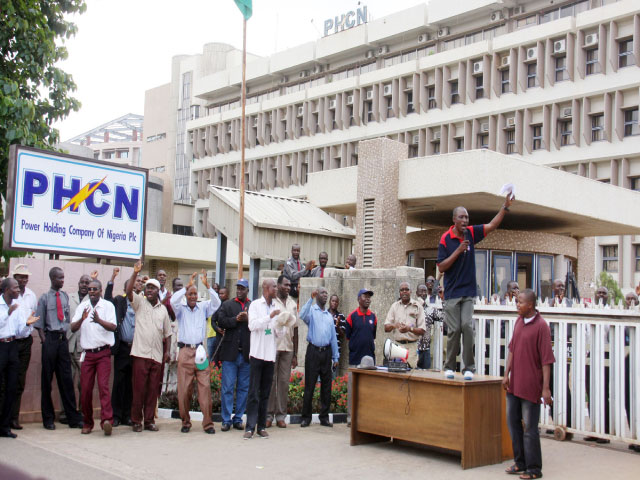Prolonged negotiations between electricity workers and the Federal Government over their pension pay-out came to an end on Tuesday night in favour of the workers.
The agreement reached early Tuesday morning in the Office of the Secretary-General of the Federation is that the Federal Government shall pay the workers their pension that had accumulated by 30 June 2007 on the basis of 25% of their salaries.
The payment, however, is subject to new conditions of service that commenced from 2010,while pension accruals from July 1, 2007 will be based on 15% of annual salaries as stipulated in the Pensions Reform Act 2004.
This brings to an end the conflict between the workers and the Federal Government which started in 2010 over their termination benefits.
The former Minister of Power, Prof Barth Nnaji had insisted on the workers being paid according to the 2004 Pensions Reform Act, while the workers had insisted on their 25% in accordance with their Superannuation Fund.
Nnaji’s argument was that it would amount to an illegality to pay the workers according to the old scheme, which also not properly funded. However, the workers disagreed and even threatened to disrupt the privatization process unless they were paid along the old scheme.
But the Tuesday meeting saw both parties come to an agreement to make peace and the workers declaring full support for the privatization process.
They also agreed that the workers receive 25% of the amount payable with the remaining 75% paid into their Retirement Savings Accounts, in addition to a severance package of 20% of accrued benefits, among others.
The agreement read in part, “Total accrued gratuity as at June 30, 2012 shall be paid in accordance with the defined benefit scheme stipulated in the PHCN 2010 conditions of service; 15 per cent pension contribution shall be paid from July 1, 2007 through June 30, 2012 in accordance with the provisions of the Pension Reform Act 2004.”
The Secretary to the Government of the Federation, Senator Pius Anyim Pius, signed on behalf of the government team which also included the Minister of Labour, Chief Emeka Wogu and Minister of Power, Mrs Zainab Kuchi. The Labour team was led by the President, Trade Union Congress, Mr Peter Esele and the Secretary-General, National Union of Electricity Employees, Mr Joseph Ajaero, both of whom signed on the workers’ behalf.
In his remarks, Esele said both parties had to shift ground in the interest of the country.
“Now, the government will have no more excuse that the union is preventing the reforms from working. We hope to see 24-hour power supply in Nigeria soon,” he said.
The Federal Government had recently set up a panel to look into the PHCN Superannuation Fund, which is headed by the former Auditor-General of the Federation, Mr Joseph Ajoboye, who had disclosed that as much as N250bn is missing from the fund.
While presenting the committee’s report, he also disclosed that £2.2m of the company’s funds were traced to a Barclay’s Bank London account.
He said despite the fact that the entitlement of workers is now at N300bn, only N50bn was presently in the fund leaving a shortfall of N250bn.
Ajiboye said that there was no evidence that the Federal Government had been making deductions from the workers’ salaries from the start Contributory Pensions Scheme as the workers had claimed.
With the shortfall in the superannuation fund and the failure of the workers to contribute to the new pension scheme, the Federal Government had offered to bear the responsibility of the shortfall.

